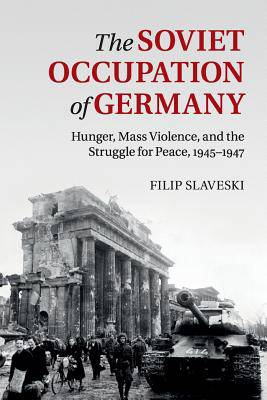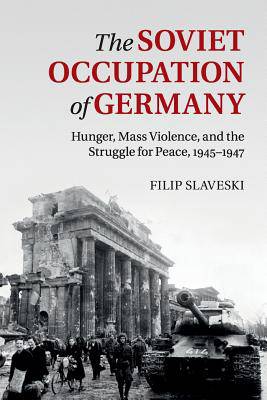
Door een staking bij bpost kan je online bestelling op dit moment iets langer onderweg zijn dan voorzien. Dringend iets nodig? Onze winkels ontvangen jou met open armen!
- Afhalen na 1 uur in een winkel met voorraad
- Gratis thuislevering in België vanaf € 30
- Ruim aanbod met 7 miljoen producten
Door een staking bij bpost kan je online bestelling op dit moment iets langer onderweg zijn dan voorzien. Dringend iets nodig? Onze winkels ontvangen jou met open armen!
- Afhalen na 1 uur in een winkel met voorraad
- Gratis thuislevering in België vanaf € 30
- Ruim aanbod met 7 miljoen producten
Zoeken
The Soviet Occupation of Germany
Hunger, Mass Violence and the Struggle for Peace, 1945–1947
Filip Slaveski
Paperback | Engels
€ 66,45
+ 132 punten
Uitvoering
Omschrijving
This is a major account of the Soviet occupation of postwar Germany and the beginning of the Cold War. Dr Filip Slaveski shows how in the immediate aftermath of war the Red Army command struggled to contain the violence of soldiers against German civilians and, at the same time, feed and rebuild the country. This task was then assumed by the Soviet Military Administration in Germany (SVAG) which was established to impose order on this chaos. Its attempt, however, intensified the battle for resources and power among competing occupation organs, especially SVAG and the army, which spilled over from threats and sabotage into fighting and shootouts in the streets. At times, such conflicts threatened to paralyse occupation governance, leaving armed troops, liberated POWs and slave labourers free to roam. SVAG's successes in reducing the violence and reconstructing eastern Germany were a remarkable achievement in the chaotic aftermath of war.
Specificaties
Betrokkenen
- Auteur(s):
- Uitgeverij:
Inhoud
- Aantal bladzijden:
- 188
- Taal:
- Engels
Eigenschappen
- Productcode (EAN):
- 9781316635483
- Verschijningsdatum:
- 15/12/2016
- Uitvoering:
- Paperback
- Formaat:
- Trade paperback (VS)
- Afmetingen:
- 152 mm x 229 mm
- Gewicht:
- 258 g

Alleen bij Standaard Boekhandel
+ 132 punten op je klantenkaart van Standaard Boekhandel
Beoordelingen
We publiceren alleen reviews die voldoen aan de voorwaarden voor reviews. Bekijk onze voorwaarden voor reviews.











